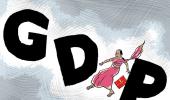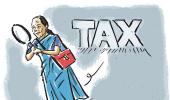Former RBI governor Raghuram Rajan on Monday said the central bank will have to raise interest rates to tame inflation and the hikes need not be considered by politicians and bureaucrats as some "anti-national" activity.

Known for his frank views, Rajan also said it was important to remember that the "war against inflation" is never over.
"Inflation is up in India. At some point, the RBI will have to raise rates, like the rest of the world is doing," he said in a LinkedIn post.
Costlier food items pushed the retail inflation to a 17-month high of 6.95 per cent in March, above the upper tolerance level of the RBI, while the wholesale price-based inflation rose to a four-month peak of 14.55 per cent, mainly due to hardening of crude oil and commodity prices.
"... politicians and bureaucrats will have to understand that the rise in policy rates is not some anti-national activity benefiting foreign investor, but is an investment in economic stability, whose greatest beneficiary is the Indian state," he emphasised.
Rajan is currently a professor at the University of Chicago Booth School of Business.
Earlier this month, the Reserve Bank of India (RBI) kept borrowing costs unchanged at a record low for the 11th time in a row in a bid to continue supporting economic growth despite inflation edging higher.
While the RBI has raised the retail inflation projection for the current financial year to 5.7 per cent from the earlier forecast of 4.5 per cent, the benchmark interest rate was retained at 4 per cent.
Addressing criticism that higher rates held back the economy during his term, Rajan said he became RBI governor with a three-year term in September 2013 when India had a full-blown currency crisis with the rupee in free fall.
"Inflation was at 9.5 per cent then, the RBI raised the repo rate from 7.25 per cent in September 2013 to 8 per cent to quell inflation.
"As inflation came down, we cut the repo rate by 150 basis points to 6.5 per cent," he recalled.
The eminent economist said: "We also signed on to an inflation targeting framework with the government."
While noting that these actions not only helped stabilise the economy and the rupee, he said between August 2013 and August 2016, "inflation came down from 9.5 per cent to 5.3 per cent."
Of course, not all this was the RBI's doing, but some clearly was, Rajan said, adding that it was not a flash in the pan.
"The RBI has since maintained low inflation and low interest rates through troubling times like the demonetization, the fall-off in growth, and the pandemic," he argued.
Rajan said today, foreign reserves have climbed to over $600 billion, allowing the RBI to calm financial markets even as oil prices have climbed.
"Recall that the crisis in 1990-91, when we had to approach the IMF, was precipitated by higher oil prices.
"The RBI's sound economic management has helped ensure this has not happened this time," he noted.
While admitting that no one is happy when interest rates have to be raised, Rajan said he still gets brickbats from politically-motivated critics who allege the RBI held back the economy during his term.
Noting that some of his predecessors were similarly criticised, he asserted: "It is essential that the RBI does what it needs to, and the broader polity gives it the latitude to do so."











 © 2025
© 2025